mifeature
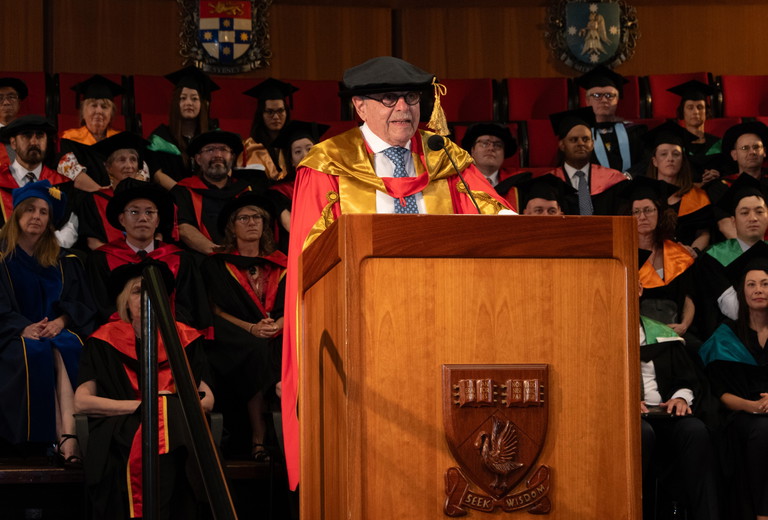
Donald Ezekiel AM receiving an honorary doctorate from the University of Western Australia in 2023. Photo courtesy UWA.
Seeing Business
The Legacy of Don Ezekiel
Few individuals have left as indelible a mark on the field of optometry as Donald (Don) Ezekiel AM. A pioneer, innovator, and entrepreneur, Mr Ezekiel’s contributions to contact lenses and ocular health have transformed lives around the world.
From the early days of fitting scleral lenses to developing the world’s first foldable intraocular lens made from hydrogel, his career has been defined by ingenuity, perseverance, and an unwavering commitment to improving vision.
Mr Ezekiel spoke with mivision’s Michelle Hauschild about his memoir, My Interesting Life.
WRITER Michelle Hauschild
It’s almost as if Don Ezekiel’s journey into optometry was preordained. His father had a successful optometry practice in Singapore, before escaping to Australia – and settling in Perth – during World War II. With Australian authorities refusing to recognise his qualifications, he supported his family by welding together broken shell spectacle frames, a young Don Ezekiel often sitting by his side.
Watching his father navigate these challenges, Mr Ezekiel developed a deep appreciation for the profession. However, he humorously admits that his initial motivation for choosing optometry over medicine was pragmatic: “I was a very lazy student when I was at school, and optometry was four years, while medicine was six years. So, I took the easy option.”
But what began as a practical choice turned into a lifelong passion. Encouraged by his father to specialise, Mr Ezekiel ventured into the then-nascent world of contact lenses. He travelled to Sydney to study under J. Lloyd Hewitt, a pioneer in scleral lenses. Then, with Challis, his bride of just four days, he headed to London for further study.
Needing contact lens work experience; he chanced upon an optical store and was offered a job by the legendary Dr Josef Dallos. Having never heard of Dr Dallos, Mr Ezekiel called Bob Fletcher, who ran the advanced contact lens course he’d attended at Northampton Polytechnic Optometry University (later City University) for advice.
“He told me to check the front page of my contact lens textbook. There I learnt that Dallos was a famous pioneer in contact lenses and that the university had tried for years to get someone to learn about his fitting technique for glass scleral lenses.
“How lucky was I!
“Dallos was only fitting glass scleral lenses for patients with a range of pathological corneal problems. He pioneered the fenestration of a scleral lens to enable tears and oxygen flow to the cornea so that wearing time could be extended from four hours to all day comfortable wear. He also pioneered the taking of an impression of the eye, which would simplify and improve the accuracy of scleral lens fitting.”
Mr Ezekiel took the opportunity to work with Dr Dallos, who became “like a father figure to me”.
“I spent hours talking with him when he explained how he had made the discoveries he was famous for and he taught me how to research.”
Dr Dallos was influential in Mr Ezekiel’s decision to make his own lenses, advising that doing so would enable him to develop and provide specialised lenses for his patients.
“Dallos told me, ‘Don’t accept the lens options available, you can always do better’.”
Listening to Mr Ezekiel reminiscing about his early contact lens career is like working your way through the ophthalmic ‘Who’s Who’. Alongside Joseph Dallos, he collaborated and learnt from Montague Reuben, Norman Bier, George Nissel, and Ida Mann.
Among the fascinating historical anecdotes that he gathered along the way is that of Dr Dallos’ escape from Budapest to London, care of Ida Mann (later Dame Ida Mann) a British ophthalmologist who moved to Perth in 1949.
“When Dallos found out I lived in Perth, he asked if I knew Ida Mann. Ida lived a few blocks from my home, and she referred Inside Gelfex Laboratories. to me for lenses. She told me she’d been instrumental in getting Dallos out from Budapest to London at the end of World War 1, when returning soldiers were suffering from painful mustard gas dystrophy.”
“If you have an idea, get it made. If your laboratory won’t do it, find one that will”
Mr Ezekiel explained that Dame Ida had read about the wonderful results Dr Dallos had achieved fitting these soldiers with scleral lenses. Together with two other ophthalmologists, they went to Budapest to learn the fitting technique.
Finding the technique “not straight forward”, Dame Ida returned to Budapest for further instruction and decided to convince Dr Dallos to return to London. In a letter (now in the contact lens museum in Portland) she described putting Dr Dallos in a taxi, plying him with alcohol, and instructing him that Hungary was ‘not the place for a Jewish boy’.
Dame Ida succeeded in her attempt and on Dr Dallos’ return to London, Theodore Hamblin – a fellow inventor and spectacle maker – established a contact lens clinic in New Cavendish Street from where he could work.
“I was just so lucky… I was in the right place at the right time and fortunate to meet pioneering lens specialists who opened doors for me,” Mr Ezekiel said.
THE BIRTH OF GELFLEX
Upon returning to Australia, Mr Ezekiel followed Dr Dallos’ advice and set up his own contact lens laboratory in Perth, initially to provide customised solutions for his own patients. Established as Western Australian Contact Lens Manufacturing, the name was later changed to Gelflex Laboratories.
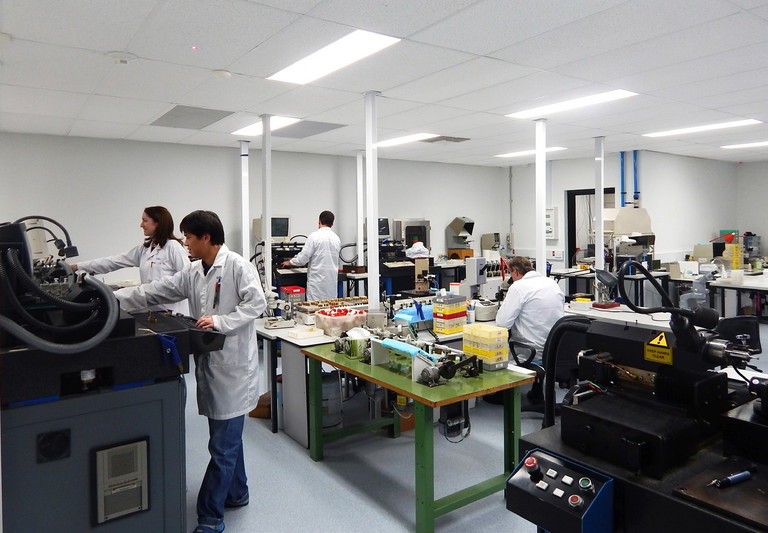
Inside Gelfex Laboratories.
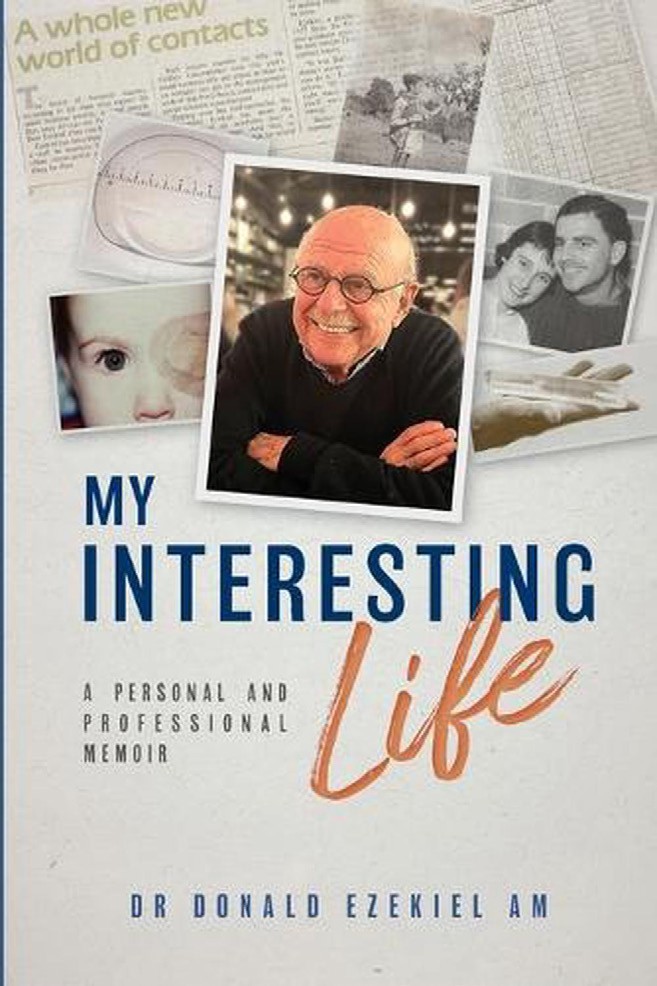
However, establishing a laboratory was not without its challenges. Soon after the equipment arrived, Mr Ezekiel received a High Court writ from a United States group, advising that he was infringing on its patent (lathing of the lens in a hard form and then hydrating the lens to form a soft lens). Prior publications describing the process were discovered, resulting in the writ having no substance. For Mr Ezekiel, this was an early introduction to the workings of multinationals, and it prepared him well for the future.
With these legalities behind him, Mr Ezekiel focussed on growing his business. Due to the time-consuming nature of customised scleral lenses, few practitioners offered the same service and so demand grew, along with his reputation. He began receiving referrals from across the country and overseas for cases where conventional lenses were inadequate.
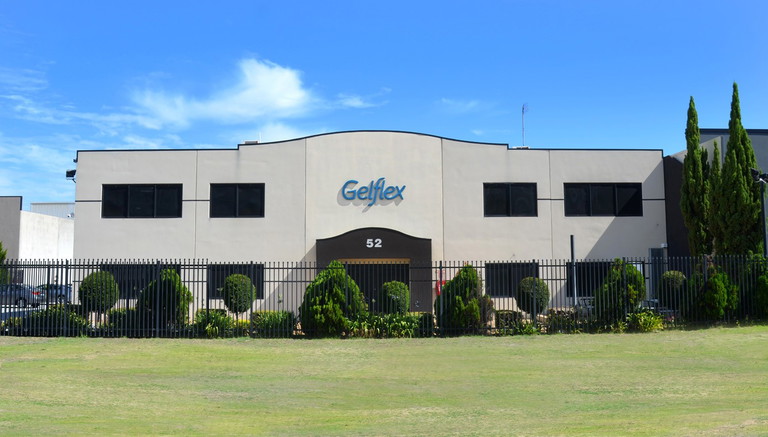
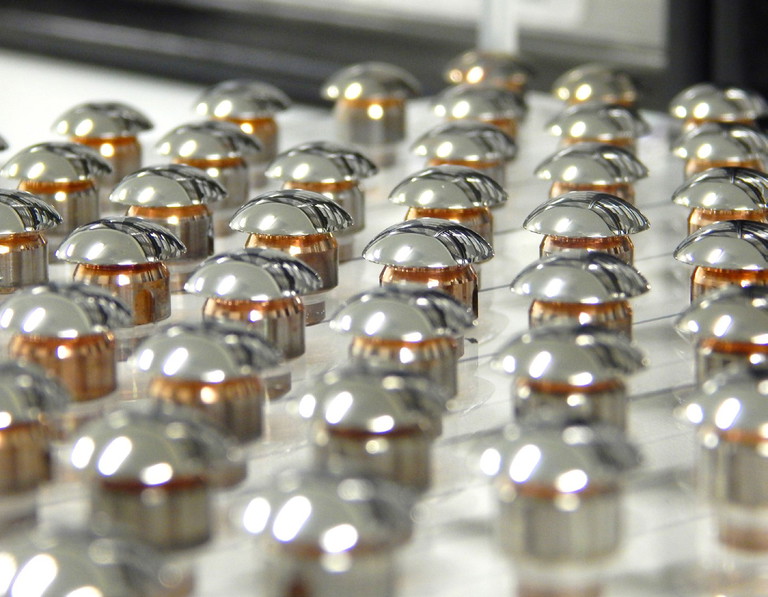
Disposable contact lens production at Gelflex Laboratories.
Alongside manufacturing lenses to order, Mr Ezekiel continued to research and develop new lens technologies. One of his most significant contributions was introducing the use of gas permeable (GP) materials for scleral lenses, allowing oxygen permeability to the cornea and enabling the lenses to be worn for longer periods without compromising eye health.
Mr Ezekiel recalls the sceptical response received to his first paper on the use of GP materials for scleral lenses, presented at the annual meeting of the British Contact Lens Society in Harrogate.
By demonstrating the results he’d achieved for his own patients, Mr Ezekiel was able to win them over and today GP scleral lenses are the most fitted rigid lens in the world with seminars and papers dedicated to the use of GP materials for scleral lenses.
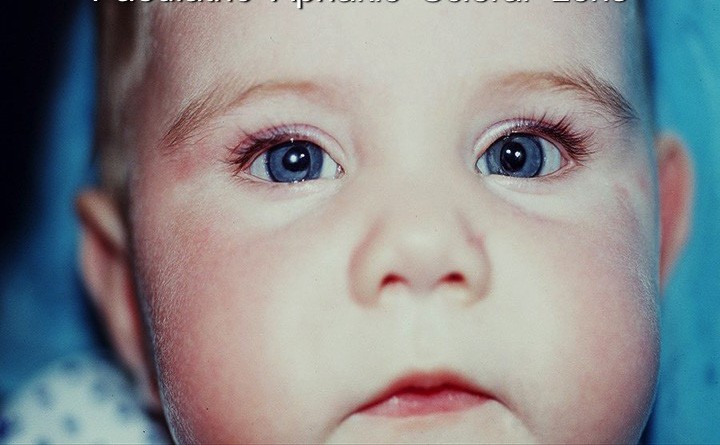
A child fitted with a paediatric aphakic scleral lens.
THE IOGEL LENS
Another groundbreaking achievement was his role working with ophthalmologist Graham Barrett, in developing the world’s first foldable intraocular lens made from hydrogel, called the IOGEL lens (pictured above).
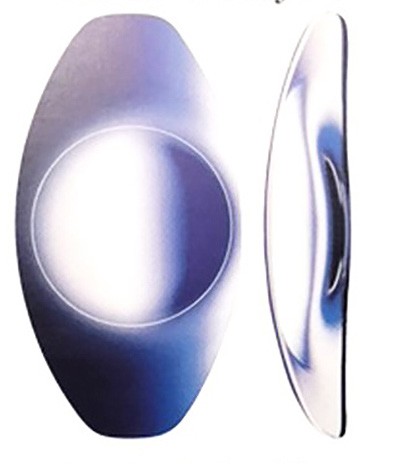
In 1985, Gelflex Laboratories won the WA and national Small Business Award.
The advantage of this lens was that it required only a small limbal incision, making cataract surgery less invasive, and allowing for faster patient recovery.
In 1985, Gelfex Laboratories won the Western Australian and national small business awards.
But innovation often comes with setbacks, and Mr Ezekiel faced his share of them. Large corporations attempted to bypass his patents, manufacturing challenges arose, and competitors sought to undermine his progress. Yet, he remained undeterred and even today advises aspiring innovators that we can always do better, “If you have an idea, get it made. If your laboratory won’t do it, find one that will”.
A LEGACY OF PROBLEM-SOLVING
Mr Ezekiel’s approach to optometry was always rooted in problem-solving – he didn’t just accept the status quo – he challenged it. Whether it was improving bifocal contact lenses to provide clearer vision, or advocating for more oxygen-permeable materials, his work consistently pushed the industry forward.
In 1997, Mr Ezekiel was awarded a Member of the Order of Australia (AM) in recognition of service to the optometric profession and for the development of RGP scleral contact lens.
In 2005 he was awarded the Herschel Medal by the International Society of Contact Lens Specialists. He is now an honorary life member.
In 2010, after 40 years in operation, he sold his Gelflex laboratory.
The accolades continued. In 2023, he was awarded an honorary doctorate from the University of Western Australia.
And despite now being formally retired, Mr Ezekiel continues to innovate. He continues working on a new bifocal lens that has the potential to revolutionise the market. “At 88, I’m still working on it,” he chuckles, “unlike all simultaneous vision lenses now available, the soft translating bifocal lens provides optimal clear vision, without compromise,” he told mivision.
WHAT IS SUCCESS?
Despite being based in Perth, one of the most isolated cities in the world, Mr Ezekiel built a thriving export business that supplied lenses to more than 20 countries. His international success was a testament to his ability to identify and solve practical problems, often before the rest of the industry recognised them.
Asked to reflect on his personal definition of success, Mr Ezekiel again brings it back to the one driving force behind his “busy, interesting life”.
“Success for me is when a patient with a visual problem can be fitted with a contact lens, achieving vision they had never previously had.
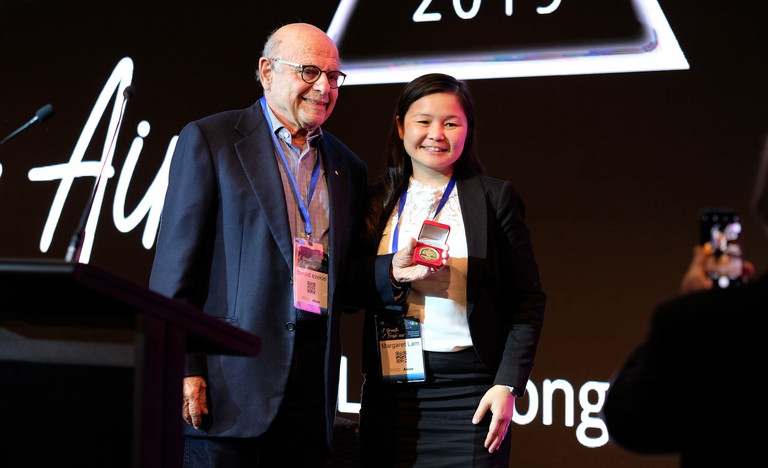
Dr Ezekiel being presented with the Kenneth W. Bell Medal for his distinguished contribution to the field of cornea and contact lenses by Dr Margaret Lam in 2019.
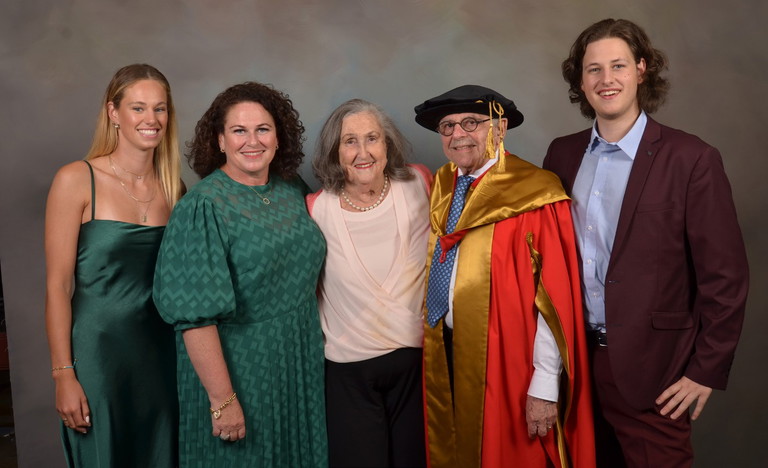
Don Ezekiel with family members at the ceremony presenting him with an Honorary Doctorate by the University of Western Australia. Photo courtesy UWA. Below, being honoured for his involvement in gas permeable scleral lenses by the International Summit of Speciality Contact Lenses in Italy in 2019.
“Success for me is when a patient with a visual problem can be fitted with a contact lens, achieving vision they had never previously had”
“We are in the seeing business. This is what we are about.
“It is very satisfying to know that patients worldwide now have access to visual results that would not have been possible without the lens I pioneered.”
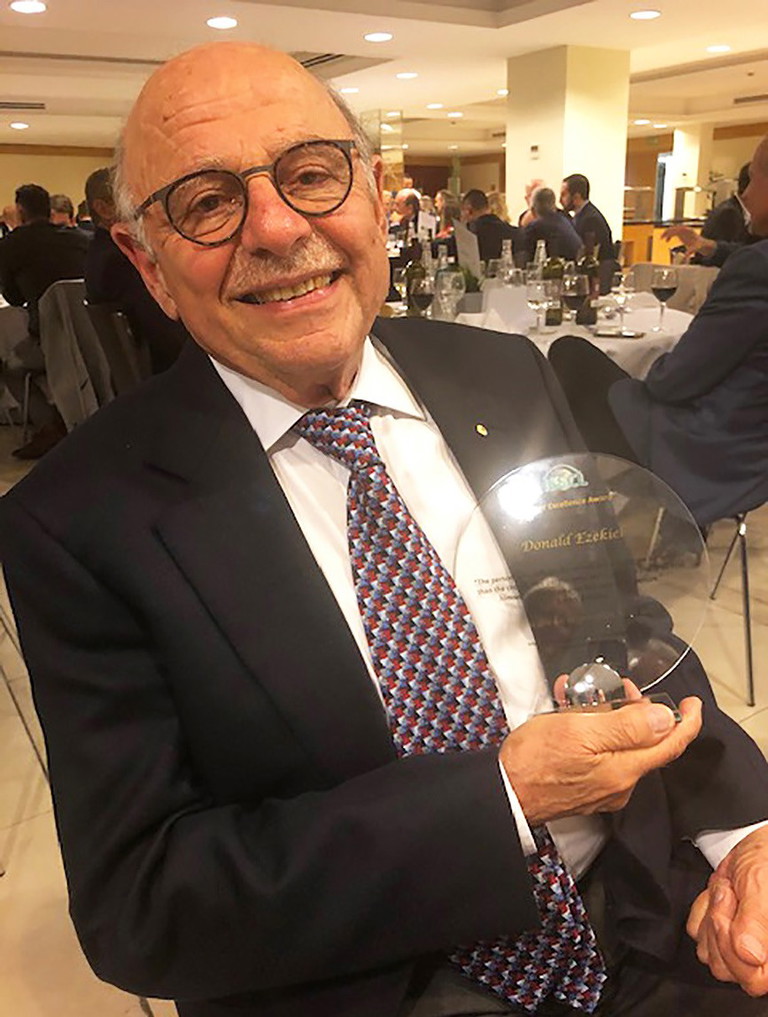
Dr Donald Ezekiel AM DipOpt (WA) FAAO DCLP FACLP FCLSA has written a personal memoir, My Interesting Life: A Personal and Professional Memoir. Published by Ingram Spark, inquiries can be directed to thewritingeditor.com.au.